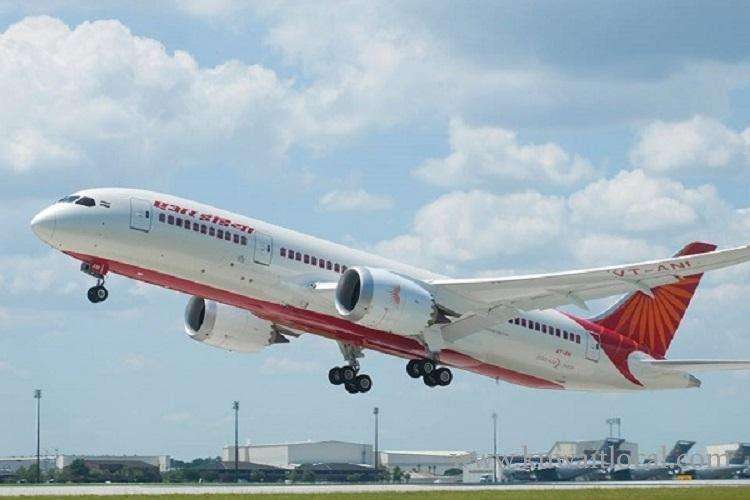Latest News
- Court Sentences Bank Employee To 5 Years For Embezzling 100,000...
- Fake ‘Sheikh’ Sentenced To 2-yr As Court Overturns Verdict
- Justice Ministry New Service On The Sahel App
- Ministry Probes 68 Cases Of Illegal Charity, Funds Collection
- Globally, Kuwait Is Among The Top Consumers Of Incense And Oud O...
- Decrease Seen In Foreign Investment
- Kuwait Customs Seized 2 Containers Laden With Tobacco At Shuwaik...
- Unpaid Salaries, Accountant Beaten Up By Workers
- The Sahel App Was Not Hacked, A Spokesman Claims
- Four Expats Arrested For Stealing Copper Cables Worth 60,000 Din...
- Indian National Died In Abdalli Car Accident
- Work Permits And Foreign Worker Transfers Are Amended By PAM
Cabinet Gives In-principle Nod For Privatisation Of Air India

Moving ahead on the proposal for privatisation, the Union cabinet on Wednesday gave its in-principle approval for divestment of Air India, whose debt has mounted to Rs 50,000 crore besides huge losses.
"In-principle approval for Air India divestment has been given," Finance Minister Arun Jaitley told a press briefing after the cabinet meeting chaired by Prime Minister Narendra Modi.
"The Civil Aviation Ministry's proposal for formation of a group under the chairmanship of the Finance Minister to decide the modalities of divestment process has also been accepted," he said.
Apart from Jaitley, the group will include Civil Aviation Minister Ashok Gajapathi Raju and some other ministers to be decided by the Prime Minister.
The group will guide the process on strategic divestment and decide that the treatment of unsustainable debt of Air India and hiving-off of certain assets to a shell company, officials said.
The demerger and strategic divestment of three profit making subsidiaries, the quantum of disinvestment and the universe of bidders will also be taken up by the ministerial group to be headed by Jaitley.
Jaitley has in the recent past expressed strong views on the need to divest Air India considering that it had acquired heavy losses over a long period.
"There are many private airlines like Jet Airways, IndiGo, GoAir. If 86 per cent of the aviation market can be handled by private sector, then 100 per cent can also be handled by the private sector," Jaitley had said.
National passenger carrier Air India currently has a market share of 14 per cent and a debt of Rs 50,000 crore. The private airlines enjoy 86 per cent of the market share.
"Air India has a debt of Rs 50,000 crore. Its valuation of aircrafts will be at Rs 20,000-25,000 crore. The civil aviation ministry is exploring all possibilities," Jaitley had said.
In a recent report to the Civil Aviation Ministry, the NITI Aayog recommended strategic disinvestment in the loss-making Air India, by which government control would be transferred to a private owner.
The airline in 2015-16 had posted an operating profit of Rs 105 crore. For the last fiscal 2016-17 the company is expected to report an improved operating profit margin.
The flag carrier had got a new lease of life on April 12, 2012, when the previous central government under the UPA regime had approved a Rs 30,000 crore turnaround (TAP) and financial restructuring plans (FRP) package spanning up to the year 2021.
The mega financial package came with stringent riders like maintaining high on-time performance and healthy load factors.
The central government under the TRP had allocated to infuse an additional equity of Rs 1,800 crore in the cash-strapped airline for 2017-18 fiscal.
Currently, Air India's portfolio of subsidiaries include Air India Engineering Services, Air India Transport Services, Alliance Air, Air India Express and the Hotel Corporation of India. It also has a ground handling joint venture AISATS.
Apart from its subsidiaries, the national passenger carrier owns several properties in India and abroad, operational slots at international airport and priceless art work, besides a well trained manpower.
According to the company's website, Air India operates 118 different kinds of aircraft. Its international network consists of 41 destinations across the US, Europe, Australia, Far East and South East Asia and the Gulf.
The airline's domestic network covers 72 destinations, including far-flung areas of the North-East, Ladakh, Andaman and Nicobar Islands.
SOURCE : IIK
Trending News
-
 Eid Al Fitr 2024: Crescent Moon Not Sighted In Sau...
08 April 2024
Eid Al Fitr 2024: Crescent Moon Not Sighted In Sau...
08 April 2024 -
 Kuwait Implements Home Biometrics Services Ahead O...
14 April 2024
Kuwait Implements Home Biometrics Services Ahead O...
14 April 2024 -
 When Will Eid Al Fitr 2024 Take Place In Qatar, Ba...
08 April 2024
When Will Eid Al Fitr 2024 Take Place In Qatar, Ba...
08 April 2024 -
 On Sunday, The Meteorological Department Warns Of...
07 April 2024
On Sunday, The Meteorological Department Warns Of...
07 April 2024 -
 Kuwait Airways Provides Update On Flight Schedule...
14 April 2024
Kuwait Airways Provides Update On Flight Schedule...
14 April 2024 -
 Kuwait Airways Introduces Convenient Home Luggage...
15 April 2024
Kuwait Airways Introduces Convenient Home Luggage...
15 April 2024 -
 Gathering For Eid Al-Fitr Prayers: Kuwaiti Citizen...
10 April 2024
Gathering For Eid Al-Fitr Prayers: Kuwaiti Citizen...
10 April 2024 -
 Winners Of Kuwait National Assembly 2024 Elections
06 April 2024
Winners Of Kuwait National Assembly 2024 Elections
06 April 2024 -
 An Egyptian Expat Dies At Kuwait's Airport
11 April 2024
An Egyptian Expat Dies At Kuwait's Airport
11 April 2024 -
 Bay Zero Water Park Kuwait: Summer Season Opens Ei...
11 April 2024
Bay Zero Water Park Kuwait: Summer Season Opens Ei...
11 April 2024











Comments Post Comment